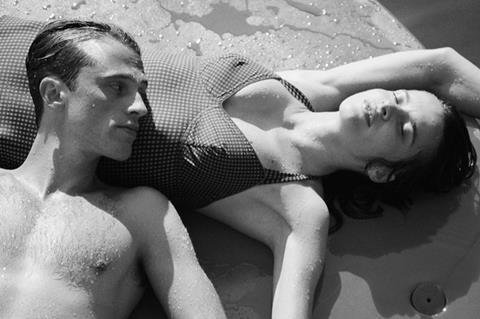Black-and-white Venice Competition title is adapted from Albert Camus story and stars Benjamin Voisin and Rebecca Marder

Dir/scr: Francois Ozon. France. 2025. 122 mins
Published in 1942, Albert Camus’ novella L’Etranger (translated variously in English as ‘The Stranger’ or ‘The Outsider’) never gets old. Francois Ozon’s adaptation is at its best when it sticks to the letter and tone of Camus’ enduring, enigmatic novella, about a young settler in 1930s Algiers who engages in a love affair before murdering a stranger. Shot in moody, period-appropriate black and white, and casting young French actors Benjamin Voisin and Rebecca Marder, the film has an alluring, zeitgeisty quality that should, despite some problems of tone and balance, secure decent arthouse results following its premiere in Venice competition.
At its best when it sticks to the letter and tone of Camus’ enduring, enigmatic novella
Remarkably, given the succinct clarity of a novella that unspools as a series of stark, easily visualised scenes, Camus’ book has only been adapted with any degree of faithfulness once before – in 1967 by Luchino Visconti, with Marcello Mastroianni in the role of the film’s ‘hero’. Viewed today, that film feels pretty radical, because it withholds audience sympathy from Meursault (played here by Voisin) – the French functionary who, in the novella, kills a young Arab man for no apparent reason.
Ozon can’t – or won’t – do that, so his task becomes more complex: to make us feel for a man who doesn’t emote much, a man who when asked in court what he now feels about the murder he committed, replies: “a certain ennui”. It’s a task made all the more complex by the cultural and political ramifications of the modern world. The director’s attempts to take this issue on board – for example, by giving a name and a weight to the character of the dead man’s sister, only briefly glimpsed in the book – don’t quite convince, because Ozon cannot afford to turn Meursault into a racist, or an instrument of colonial oppression.
Yet for most of its running time, until a stretched final 20 minutes, The Stranger is a reasonably absorbing study of a man for whom everything seems to mean less than zero. As written by Ozon and played by a convincing Voisin (who shot to attention in Ozon’s Summer of ’85), Meursault is not your standard-issue sociopath. He’s a withdrawn observer, one who seems content to let life happen to him, who acts only when prompted.
At his mother’s funeral, he does everything required of a dutiful son – except to show anything resembling sadness or grief. The next day, he goes to a beach club, where he meets up with Marder’s secretary Marie, takes her to the cinema to see a comedy, and embarks on a sexual relationship – one shot, in true Ozon style, with a crackling yet tasteful erotic charge. He also interacts with two neighbours. One is Denis Lavant’s Salamano, a withered, lonely old man disconsolate after the loss of the dog he maltreated while it was alive. The other is a boorish, manipulative pimp played with sweat-stained authenticity by Pierre Lottin, whose abuse of his Algerian mistress will precipitate the crime at the centre of the film.
That occurs around the mid-point – and it comes with a brief hint that there may be a homoerotic motive, one that feels gratuitous because it is neither anticipated nor pursued. The second part of the film traces Meursault’s incarceration and trial. Ozon suggests – particularly through a scene in which a prison chaplain (Anatomy Of A Fall’s Swann Artaud) encourages the condemned man to embrace God – that there is a kind of heroism in nihilism, in staying true to yourself as you stride towards oblivion.
Like George Washington, Meursault cannot tell a lie. His contempt of the hypocrisy of a society that will condemn a man to death for not crying at his mother’s funeral is noble; his comment to a policeman that he’s rather looking forward to his trial because he’s never witnessed one before is weird. That chilling anomie keeps undermining the touch of martyrdom that Ozon brings to his central character (who in prison becomes Christ-like even in appearance as his hair and beard grow out).
On his fifth film with Ozon, Belgian cinematographer Manu Dacosse brings a love of texture, of surfaces, shadows and skin, to a story often recalled as a cerebral literary exercise. Grates, prison bars, latticework skylights and the shadows they cast – the camera notes these details just as Meursault does. A beetle on top of a wall is as worthy of attention, for him, as a pretty woman or a prosecuting magistrate. An atmospheric ambient soundtrack by Kuwaiti musician Fatima Al Qadiri laps around the edges of the action, reminding us that these strange colonial incomers are in a strange land.
Production company: Foz
International sales: Gaumont communication@gaumont.com
Producer: Francois Ozon
Screenplay: Francois Ozon, with the collaboration of Philippe Piazzo, based on the novel by Albert Camus
Cinematography: Manu Dacosse
Production design: Katia Wyszkop
Editing: Clement Zelitzki
Music: Fatima Al Qadiri
Main cast: Benjamin Voisin, Rebecca Marder, Pierre Lottin, Denis Lavant, Swann Arlaud, Christophe Malavoy, Nicolas Vaude
























